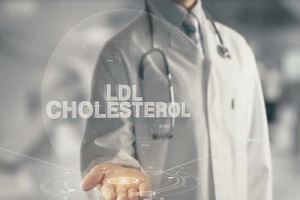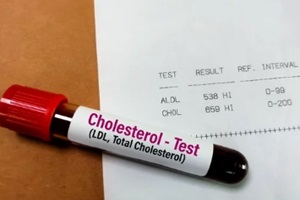 High LDL cholesterol refers to elevated levels of low-density lipoprotein (LDL) cholesterol in your blood. LDL cholesterol is called “bad” cholesterol because it can lead to plaque buildup in your arteries and increase your risk for heart disease and stroke.
High LDL cholesterol refers to elevated levels of low-density lipoprotein (LDL) cholesterol in your blood. LDL cholesterol is called “bad” cholesterol because it can lead to plaque buildup in your arteries and increase your risk for heart disease and stroke.
Understanding the dangers of high cholesterol and how to manage it is essential for protecting your cardiovascular health.
Causes of High LDL Cholesterol
High LDL cholesterol levels rarely occur randomly or spontaneously. In most cases, an unhealthy lifestyle or underlying health condition leads to excessive LDL cholesterol production in your liver or reduced clearance from your bloodstream. Common causes of high LDL cholesterol include:
- Poor Diet: Eating foods with a high content of saturated and trans fats, such as red meats, full-fat dairy, and fried or processed items, encourages your liver to produce more LDL cholesterol. A diet consisting of many refined carbohydrates, such as white bread, pasta, and sweets, can also raise LDL.
- Lack of Exercise: Being physically inactive prevents your body from using excess LDL cholesterol. Regular activity helps lower LDL levels in the blood.
- Genetics: Carrying certain genetic mutations can make your body overproduce cholesterol or prevent it from being absorbed and excreted properly. Familial hypercholesterolemia is one such genetic disorder.
- Smoking: Chemicals in cigarette smoke lower HDL (“good”) cholesterol and raise LDL levels.
- Underlying Conditions: Health issues such as chronic kidney disease, hypothyroidism, HIV/AIDS, and diabetes can all negatively impact cholesterol levels.
- Medications: Drugs such as steroids, beta blockers, and some antiretroviral drugs may inadvertently raise LDL as a side effect.
As you age, your body also becomes less efficient at regulating cholesterol, putting you at greater risk for high levels after age 40.
Dangers of High LDL Cholesterol
The real danger with high cholesterol stems from its role in the development of atherosclerosis. Atherosclerosis occurs when excessive LDL particles penetrate your artery walls and become oxidized, setting off inflammation. As immune cells arrive to clean up the damage, plaque begins to build up in your arteries.
Over time, increasing plaque accumulation causes your arteries to narrow and harden. This can restrict the amount of blood that gets to essential organs and set the stage for blood clots. High cholesterol drives this inflammatory plaque buildup faster.
The clinical manifestations of atherosclerosis depend on which of your arteries are being affected:
 Coronary Artery Disease: When plaque builds up in the arteries of your heart, it can manifest as angina (chest pain) or cause heart attacks, heart failure, and cardiac arrest. Heart disease remains America’s #1 killer.
Coronary Artery Disease: When plaque builds up in the arteries of your heart, it can manifest as angina (chest pain) or cause heart attacks, heart failure, and cardiac arrest. Heart disease remains America’s #1 killer.- Carotid Artery Disease: Plaque in the carotid arteries supplying your brain reduces blood flow and oxygen. This heightens your stroke risk and can cause transient ischemic attacks (TIAs).
- Peripheral Artery Disease: Fatty deposits in the leg arteries lead to intermittent claudication – cramping leg pain while active. Critical limb ischemia increases leg ulcer and gangrene risks.
Beyond direct effects on arteries, high cholesterol can also contribute to high blood pressure and destabilize plaques, making them prone to rupture. This further elevates your cardiovascular risk profile.
Managing Your Cholesterol
Bringing elevated cholesterol under control involves a two-pronged approach – lifestyle strategies to lower cholesterol production and medications to enhance clearance if needed.
Dietary measures include:
- Limiting saturated fat to <10% of calories and avoiding trans fats
- Eating more plant-based unsaturated fats such as olive oil and avocados
- Increasing fiber with fruits, vegetables, and whole grains
- Choosing low-fat or fat-free dairy
- Selecting lean, skinless poultry and fish over red meat
- Minimizing added sugars and refined grains
Regular physical activity for at least 2.5 hours per week also helps lower LDL cholesterol while raising protective HDL cholesterol. Quitting smoking provides dual benefits by lowering LDL and bumping up HDL.
If lifestyle strategies are insufficient after three months, cholesterol-lowering medications may be appropriate. Statins such as atorvastatin and rosuvastatin are first-line drugs that reduce LDL levels by up to 50%. Other agents, such as ezetimibe, PCSK9 inhibitors, or bile acid sequestrants, may be added for a combined effect.
Work closely with your doctor to define LDL cholesterol targets based on cardiovascular risk and tailor medication regimens accordingly. Some key risk groups that often warrant medication include:
- Patients with existing heart disease or prior cardiac events
- Individuals with exceptionally high LDL cholesterol (190 mg/dL or higher)
- People who have type 2 diabetes over the age of 40
- Those who have high blood pressure or additional risk factors such as smoking
Partner with Imperial Center Family Medicine to Take Control of Your LDL Cholesterol
 High LDL cholesterol is a modifiable risk factor for heart problems. By adopting lifestyle changes and appropriately using medications, you can lower your LDL cholesterol and reduce plaque buildup over time.
High LDL cholesterol is a modifiable risk factor for heart problems. By adopting lifestyle changes and appropriately using medications, you can lower your LDL cholesterol and reduce plaque buildup over time.
Consistent lifestyle measures and medication adherence are essential for sustained LDL cholesterol control. Follow up with your doctor every 4-12 weeks when starting new regimens to ensure your LDL is trending downward and additional adjustments are unnecessary.
Beyond lowering LDL, it also addresses related risk factors that drive atherosclerosis. Follow your doctor’s advice for controlling diabetes, high blood pressure, obesity, and quitting smoking. Together, these steps will help minimize the health dangers of high cholesterol.
Imperial Center Family Medicine’s experienced clinicians specialize in personalized cholesterol management and comprehensive heart disease prevention. Contact us today at 919-873-4437 or online to discuss your LDL cholesterol, get tested, and start safeguarding your health.
Together, we can implement an effective action plan to keep your cholesterol levels in check and optimize your heart health for the long run.
